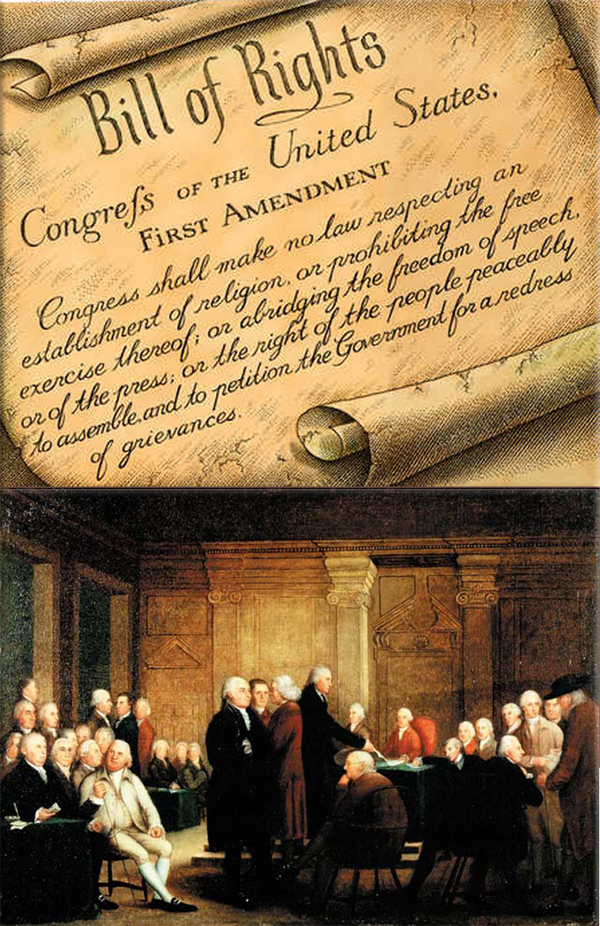
Bill of Rights passes Congress on September 25, 1789
Bill of Rights passes Congress: The First United States Congress approves 12 amendments to the U.S. Constitution, and sends them to the states for ratification. The amendments, known as the Bill of Rights, were designed to protect the basic rights of U.S. citizens, guaranteeing the freedom of speech, press, assembly, and exercise of religion; the right to fair legal procedure and to bear arms; and that powers not delegated to the federal government were reserved for the states and the people.
Influenced by the English Bill of Rights of 1689, the Bill of Rights was also drawn from Virginia's Declaration of Rights, drafted by George Mason in 1776. Mason, a native Virginian, was a lifelong champion of individual liberties, and in 1787 he attended the Constitutional Convention and criticized the final document for lacking constitutional protection of basic political rights. In the ratification process that followed, Mason and other critics agreed to approve the Constitution in exchange for the assurance that amendments would immediately be adopted.
In December 1791, Virginia became the 10th of 14 states to approve 10 of the 12 amendments, thus giving the Bill of Rights the two-thirds majority of state ratification necessary to make it legal. Of the two amendments not ratified, the first concerned the population system of representation, while the second prohibited laws varying the payment of congressional members from taking effect until an election intervened. The first of these two amendments was never ratified, while the second was finally ratified more than 200 years later, in 1992.
History Channel / Wikipedia / Biography
Wikipedia Image: United States Bill of Rights: / Second Continental Congress
• Bill of Rights 1689 (It was a restatement in statutory form of the Declaration of Right presented by the Convention Parliament to William and Mary in March 1689, inviting them to become joint sovereigns of England.)
• Magna Carta: Elias of Dereham, a steward to the Archbishop Stephen Langton with King John of England entrusted with delivering 10 of 13 copies of the Magna Carta. (The Magna Carta was the first document forced onto a King of England by a group of his subjects, the feudal barons, in an attempt to limit his powers by law and protect their privileges.)
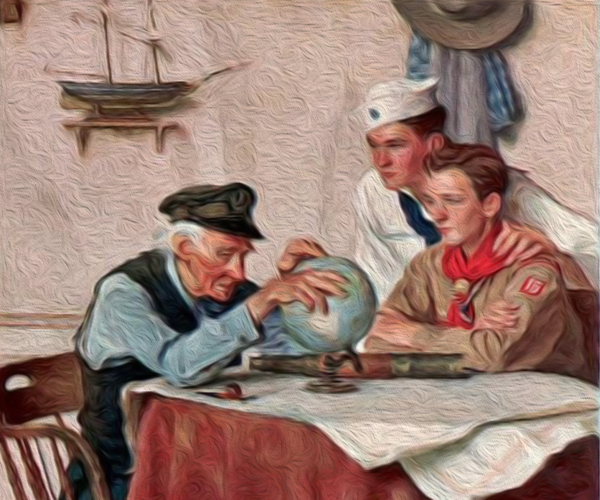
Understanding Military Terminology - espionage
(DOD) Espionage:
The act of obtaining, delivering, transmitting, communicating, or receiving information about the national defense with an intent, or reason to believe, that the information may be used to the injury of the United States or to the advantage of any foreign nation. Espionage is a violation of Title 18, United States Code, Sections 792-798 and Article 106, Uniform Code of Military Justice. See also:
Counterintelligence(FBI) / Clandestine HUMINT (HUMan INTelligence)(Wikipedia) / National Security(Harvard Law Review).
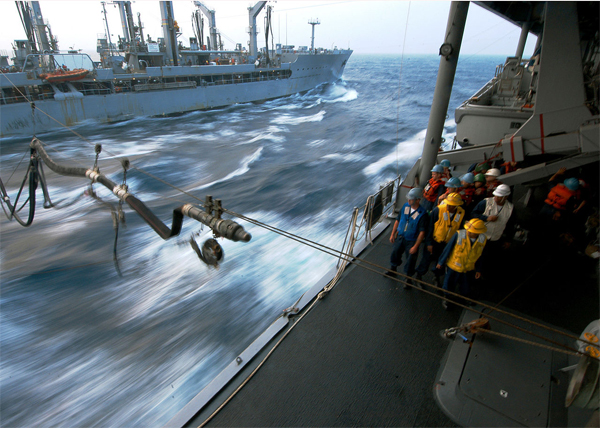
The Old Salt’s Corner
“Underway replenishment (UNREP)” (U.S. Navy) or replenishment at sea (RAS) (North Atlantic Treaty Organization/Commonwealth of Nations>) is a method of transferring fuel, munitions, and stores from one ship to another while under way. Prior to underway replenishment, coaling stations were the only way to refuel ships far from home. Early attempts at refueling and restocking at sea had been made as far back as 1870, when HMS Captain was resupplied with coal at a rate of five tons per hour. However, the speed was far too slow to be generally practicable and calm weather was required to keep the neighboring ships together. The United States Navy also became interested in the potential of underway replenishment. Lacking a similar collier fleet and network of coaling stations, and embarking on a large naval expansion, the Navy began conducting experiments in 1899 with a system devised by Spencer Miller and the Lidgerwood Manufacturing Company of New York. His device kept a cable suspended between the two ships taut, with a quick-release hook that could travel up and down the line with the use of a winch.
The first operational underway replenishment was achieved by the United States Navy oiler declaration of USS Maumee. Following the war, 6 April 1917, she was assigned duty refueling at sea the destroyers being sent to Britain. Stationed about 300 miles south of Greenland, Maumee was ready for the second group of U.S. ships to be sent as they closed her 28 May. With the fueling of those six destroyers, Maumee pioneered the Navy’s underway refueling operations under the direction of Maumee's Chief Engineer Chester Nimitz, thus establishing a pattern of mobile logistic support which would enable the Navy to keep its fleets at sea for extended periods, with a far greater range independent of the availability of a friendly port.
While during the interwar period most navies pursued the refueling of destroyers and other small vessels by either the alongside or astern method, it was the conventional wisdom that larger warships could neither be effectively refueled astern nor safely refueled alongside, until a series of tests conducted by now-Rear Admiral Nimitz in 1939-40 perfected the rigs and shiphandling which made the refueling of any size vessel practicable. This was used extensively as a logistics support technique in the Pacific theatre of World War II, permitting US carrier task forces to remain at sea indefinitely. Since it allowed extended range and striking capability to naval task forces the technique was classified so that enemy nations could not duplicate it. Presently, most underway replenishments for the United States Navy are handled by the Military Sealift Command. It is now used by most, if not all, blue-water navies.

“I’m Just Sayin’”
I Work Hard Because Millions On Welfare Depend on Me!

“Thought for the Day”
“The old believe everything, the middle-aged suspect everything, the young know everything.”
~ Oscar Wilde
“What I Have Learned”
Some people speak from experience. Some people, from experience, don't speak.
~ Anonymous

Bizarre News (we couldn’t make up stuff this good – real news story)

ORANGE, Virginia - Man with the last name Stoner is facing drug charges after police found more than $10K worth of pot plants at his home
A Virginia man with the last name Stoner is facing drug charges after police found more than $10,000 worth of marijuana plants at his home.
The Orange County Sheriff's Office says 42-year-old Paul Scott Stoner of Unionville is charged with growing marijuana and having a firearm while in possession of more than a pound of marijuana.
Media outlets report that the charges stem from an ongoing investigation related to the alleged sale of marijuana to children in Orange County. Further charges are pending.
Authorities say they acted on a tip that Stoner was selling to children and during the search last Thursday seized marijuana, marijuana plants, drug paraphernalia, prescription drugs, needles, spoons and guns.
Stoner is free on bond. A hearing is set for August 27th. PoliceOne / Associated Press

Mr. Answer Man Please Tell Us: Why can't you buy turkey eggs in stores?
Turkeys don't lay that many eggs, and the ones they do lay are used to produce more turkeys. The average egg-laying chicken lays 300 or so eggs per year, while the average turkey produces only 100 to 120. Chickens come into production at 19 to 20 weeks of age, but turkeys don't get cranking until 32 weeks.
Turkeys are also much larger, averaging 16 to 17 pounds compared to 3.5 pounds for chickens. So you'd need a lot more room for a bird that would take a lot longer to produce a lot fewer eggs.
Another problem is that turkeys go "broody" easily — they want to sit on their eggs and incubate them. In contrast, egg-producing white leghorn chickens have had the broodiness bred out of them. They lay and lay and have no desire to incubate their offspring or otherwise be maternal.
Image: Turkey-And-Egg Question: Which Came First, The Turkey Or The Egg? (Bing Image Search / World Crunch)
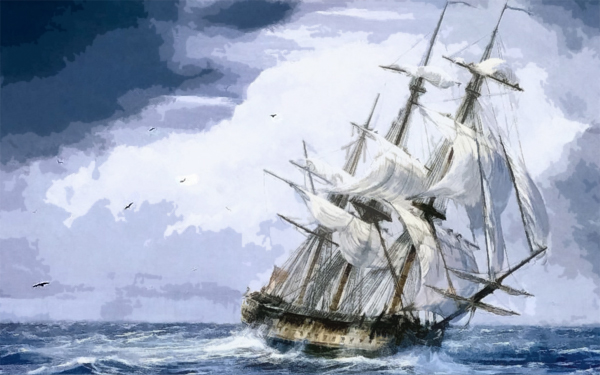
Where Did That Saying Come From?
“Taken Aback:” If the wind suddenly changed direction a sailing ship stopped moving forward. It was “taken aback”, which was a bit of a shock for the sailors.
“Aback” means in a backward direction - toward the rear. It is a word that has fallen almost into disuse, apart from in the phrase “taken aback”. Originally “aback” was two words: “a” and “back”, but these became merged into a single word in the 15th century. The word “around” and the now archaic “adown” were formed in the same way.
“Taken aback” is an allusion to something that is startling enough to make us jump back in surprise. The first to be “taken aback” were not people though but ships. The sails of a ship are said to be “aback” when the wind blows them flat against the masts and spars that support them. A use of this was recorded in the London Gazette in 1697. Phrases.org.UK
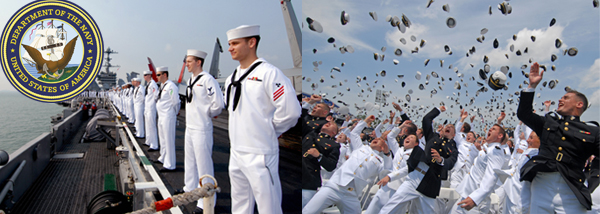
NAVSPEAK aka U.S. Navy Slang
JP5: jet fuel used on all navy ships and at all naval air stations.
JROTC: Junior Reserve Officer Training Corps.
Pushbutton: term applied to a 6 year enlistee with advanced schooling. The Enlistee is immediately granted E-3 rank upon completion of basic training, and E-4 rank upon completion of "A" school. Frequently the Enlistee also has an opportunity to extend to 8 years, and immediately gain E-5 rank within 2-3 years total service, like “pushing a magic button to gain rank”. Certain sailors who nail all promotion opportunities on the 1st attempt can make Chief (E-7) in as little as 7 years service, Senior Chief (E-8) by 10 years and Master Chief (E-9) by 13 years, unless of course, they have already gone Warrant Officer or Mustang by this time.
Pushin' Rope: Erectile dysfunction usually associated with a drunken visit to a brothel.
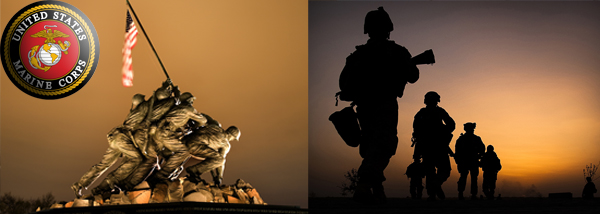
Just for you MARINE
Chi-Com: (Vietnam) Chinese Communist.
Chief of the Boat: The senior chief petty officer on a submarine..
Chieu-Hoi: (Vietnam) Unconditional surrender by an enemy soldier or force.
China Marines: Marines of the 4th Marine Regiment assigned to China in the first half of the 20th Century. Also called Horse Marines.

Navy Acronyms
MILSTRIP - Military Standard Requisitioning and Issue Procedures
MIPR - Military Interdepartmental Purchase Request
MNS - Mission Need Statement
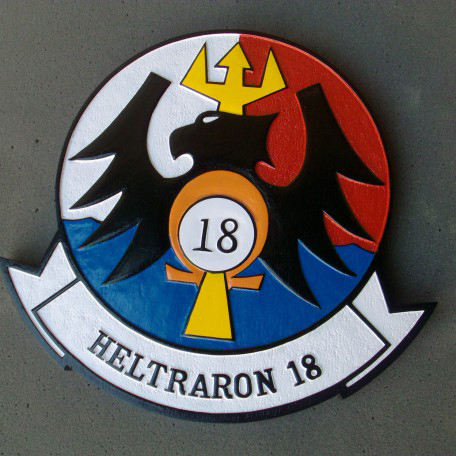
Naval Aviation Squadron Nicknames
HT-18 - Helicopter Training Squadron 18: “Vigilant Eagles” NAS Whiting Field, Florida

The Strange, Mysterious or Downright Weird

In 1993, only around 1-3% of classrooms and 23% percent of people had access to the internet, and it was not at all commercialized, though that would change completely by 1995. Now the internet is in nearly every household and every public building. You can almost get internet on any public street. It is reported that 1.2 billion people own and/or are using some kind of smartphone regularly, not to mention those who have them, but let them stay idle most of the time.
As far as numbers go, the world uses 160 Terabytes of information at any given second. In 1993 that number was as low as 100 over the entire length of the year. Today we use enough data to watch around 16 million average length Youtube videos every second! OMG Facts
OH WHAT A YEAR - 1936
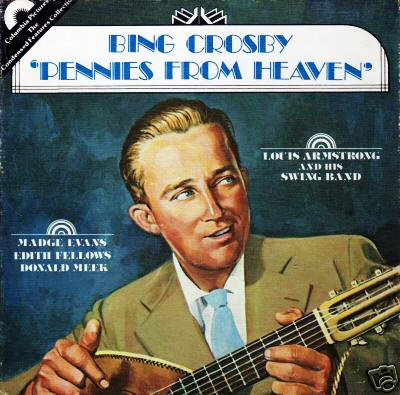
1. Pennies From Heaven - Bing Crosby
2. The Way You Look Tonight - Fred Astaire
3. Goody Goody - Benny Goodman
4. Summertime - Billie Holiday
5. Glory of Love - Benny Goodman
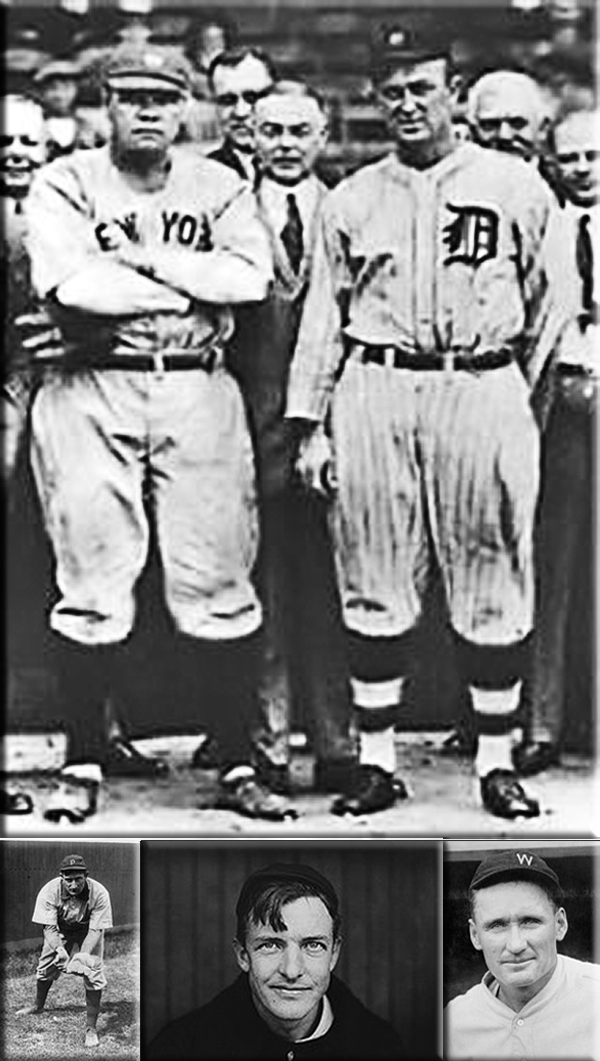
● World Series Champions: The New York Yankees defeat the New York Giants 4 games to 2
● Plans are announced for a Baseball Hall of Fame to be established in 1939, the game's supposed centennial, in Cooperstown, New York. In the first elections to select 15 initial inductees (5 from the 19th century and 10 from the 20th), Ty Cobb, Babe Ruth, Honus Wagner, Christy Mathewson and Walter Johnson are selected from the 20th century.
● NFL Champions: Green Bay Packers defeat the Boston Redskins 21–6 - the game was moved from Boston to New York's Polo Grounds
● First NFL Draft held
● Stanley Cup Champs: Detroit Red Wings defeat the Toronto Maple Leafs 3 games to 1
● U.S. Open Golf: Tony Manero
● U.S. Open Tennis (Men/Ladies): Fred Perry / Alice Marble
● Wimbledon (Men/Women) (Men/Ladies): / Helem Jacobs
● NCAA Football Champions: Minnesota
● Kentucky Derby: Bold Venture
Image: Plans are announced for a Baseball Hall of Fame to be established in 1939, the game's supposed centennial, in Cooperstown, New York. In the first elections to select 15 initial inductees (5 from the 19th century and 10 from the 20th), Ty Cobb, Babe Ruth, Honus Wagner, Christy Mathewson and Walter Johnson are selected from the 20th century.
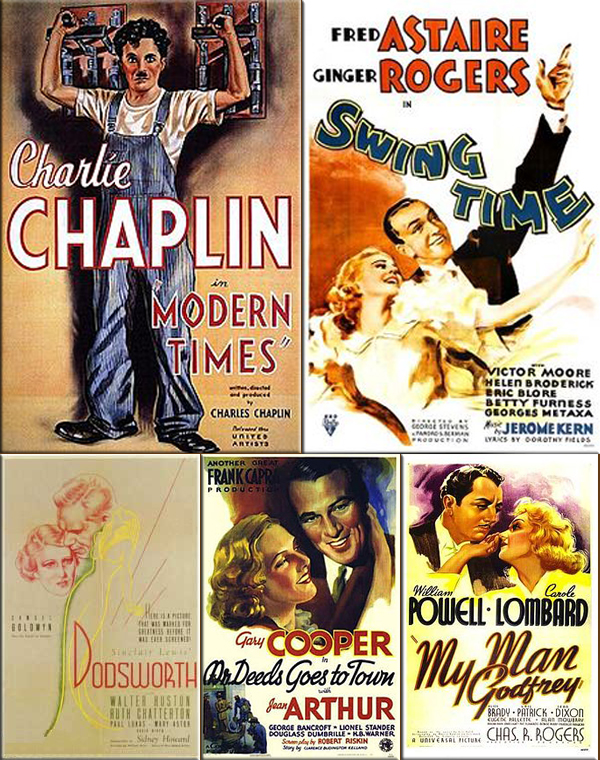
1. Modern Times
2. Swing Time
3. Dodsworth
4. Mr. Deeds Goes to Town
5. My Man Godfrey
Image: Most Popular Movies: 1936: Modern Times, Swing Time, Dodsworth, Mr. Deeds Goes to Town and My Man Godfrey
Most Popular Christmas gifts 1936
● Monopoly board game

● “Between two evils, I take the one I never tried before”
~ Mae West in “Klondike Annie” 
Image: Klondike Annie ~ Mae West, 1936

Trivia
● The Roman emperor Commodus had all of the dwarfs, cripples, and freaks collected in the city of Rome and had them brought to the Coliseum, where they were ordered to fight each other to the death with meat cleavers.
● Poland was the dominant power in Eastern Europe from the fourteenth to the seventeenth century.
● When Cecil B. De Mille released his silent film The Squaw Man in 1914, it became one of the movie industry's first nationwide box-office successes. It cost only $15,000 to make and earned more than $225,000. It was also the first film that De Mille wrote and directed; prior to The Squaw Man, De Mille worked solely as a screenwriter.
A Test for People Who Know Everything
The 1990 edition of “Who’s Who in America” contained 10 lines of information about a former President but there were 28 lines devoted to his wife. Who was the president and First Lady?
● Answer for People Who Do Not Know Everything, or Want to Verify Their AnswerWikipedia
Answer to Last Week's Test
What board game was developed during World War II as a diversion for people waiting out air raids and air raid drills in bomb shelters?
Answer: Clue, which is known as Cluedo in England, where the game originated.
Joke of the Day
A BRUNETTE, A REDHEAD & A BLONDE all worked in the same office with the same female boss. Every day, they noticed their boss left work early.
One day, the girls decided that when the boss left, they'd leave right behind her. After all, she never called in or came back to the office when she left early, so how was she to know?
The next day, they all three left the office right after the boss left. The brunette was thrilled to be home early. She did a little gardening and went to bed early.
The redhead was elated to be able to get in a quick workout at the health club before meeting her dinner date.
The blonde was happy, happy, happy to be home, but when she got to the bedroom she heard a muffled noise from inside. Slowly, quietly, she cracked open the door and was mortified to see her husband in bed with HER BOSS.
Ever so gently, she closed the door and crept out of her house. The next day at coffee break, the brunette and redhead decided they were leaving early again, and asked the blonde if she was coming with them.
“NO WAY”, she exclaimed, “I almost got caught yesterday”





















